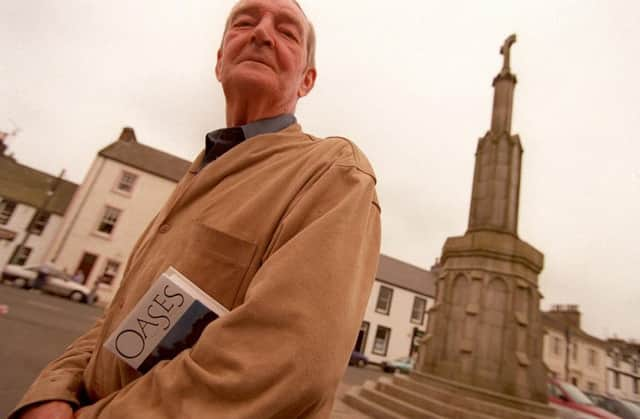Obituary: Alastair Reid, poet and scholar of South American literature


Alastair Reid was a distinguished poet, essayist, translator and traveler who lived in numerous homes throughout the world – rather reflecting his restless and inquiring nature. He had the knack of poking fun at his Scottish heritage – of which, in fact, he was immensely proud.
In his best-known poem, Scotland, he writes of meeting a shopkeeper on a blue and cloudless day and speaks about the glories of the weather. The shopkeeper replies:
Her brow grew bleak, her ancestors raged in their graves
as she spoke with their ancient misery:
“We’ll pay for it, we’ll pay for it, and we’ll pay for it.”
Advertisement
Hide AdAdvertisement
Hide AdIn fact, Reid was delightfully irreverent, always good company and a scholar and linguist of note. When he was given an honorary degree from St Andrews University, the citation read: “Alastair Reid has published more than 40 books and has read or spoken across the globe, from Yale to Edinburgh, from Chile to London…he is an international treasure, much honoured.”
Alastair Reid was a son of the manse and brought up in Galloway – an area he loved and called his “personal Eden”. He served with the Royal Navy in the last years of the war and then took a course in ciphering and coding. Reid said later: “The war changed us. It broke everything. It divided my life.”
Reid then read classics at St Andrews University and became immersed in poetry. He also gained a love for travel: different societies and cultures fascinated him. The contrast with his upbringing and the more relaxed attitude of the American troops left a distinct impression. In an interview in Edinburgh in 2005 Reid reflected: “I thought I’d like to see the country where these people came from.”
He spent a few years teaching classics in New York, then visited Mallorca, where he met Rupert Graves and fell in love with Spain and its literature. The two poets grew close and Reid did many translations for Graves (notably The Twelve Caesars) but their friendship fell apart when Reid eloped with Margot Callas, a close associate of Graves.
Reid left his wife and Margot and he lived in the Basque country. After a year she returned to Graves.
In the 1960s, Reid lived in a houseboat moored on the Thames at Chelsea Reach and in Spain. He contributed regularly to The New Yorker and one piece, From a Spanish village, was to appear regularly in the magazine over the next two decades. Reid also translated with much flair and sympathy from the original the poems of the Cuban Heberto Padilla, the Venezuelan Eugenio Montejo and the Mexican José Emilio Pachedo.
His translations of the Argentinian poet and essayist Jorge Luis Borges, in particular, brought both a fresh renown.
A colleague on The New Yorker was Dame Muriel Spark – author of The Prime of Miss Jean Brodie – and their articles often appeared in the same edition. They both shared a love of Scotland and a desire to widen horizons and experience fresh cultures. Both had a yearning to live abroad while maintaining contact with their roots.
Advertisement
Hide AdAdvertisement
Hide AdSpark described Reid as the “second worst dressed man in New York” (diplomatically, she never let on who was the worst). Reid regarded that as a compliment. His Scottish accent remained despite many years of living abroad: indeed colleagues on The New Yorker have written: “All his life he spoke with a pleasing Scottish burr.”
In 2003, he decided to return to Scotland and spent more time in Whithorn, renting a cottage close by his father’s former kirk.
Reid’s love of the wanderlust did not make him any less of a Scottish writer. Not only did he champion Scottish writing and culture abroad but as an inspired translator Reid gained a truly international following.
In 2005 the Saltire Society published Spirits of the Age in which several eminent men of letters contributed Scottish self-portraits. Reid opened his fine contribution (on not living in Scotland) with a revealing paragraph. “I have spent two-thirds of my life living outside Scotland, although I have never failed to return to it, at irregular intervals, nor have I contemplated taking another nationality.
“Scotland has always remained for me as a measure of change – change in me, change in it.”
Reid read his Digging up Scotland at the Edinburgh Book Fair and there was an exhibition organised by the book fair in 1999 at Wigtown for which Reid wrote a poem.
He received the Scottish Arts Council award in 1979 and in 2011 received honorary degrees from both St Andrews and Glasgow universities.
His first marriage ended in divorce. His second wife, Leslie Clark, survives him, along with two sons.